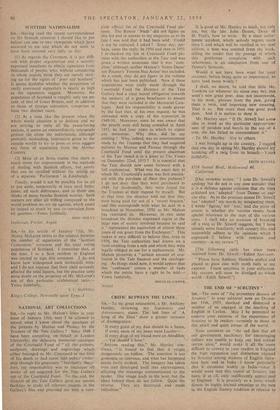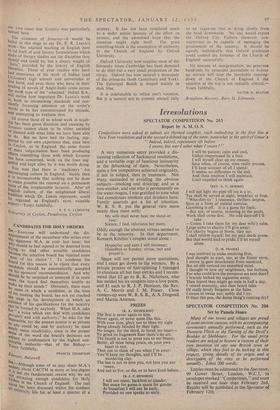THE END OF "SCRUTINY "
Sta,—The news of " the premature decease of Scrutiny" in your editorial note on De:em- ber I 1th, 1953, shocked' and dismayed a number of us engaged in the teaching of English in Ceylon. May I be permitted to endorse your estimate of the importance of Scrutiny to its readers--certainly to those in this small and quiet corner of the world.
Your comment on " the sad fact that all -- our government machinery for encouraging culture was unable to keep our best critical review alive," would make it all the more difficult to convey to your readers in England the high reputation and distinction enjoyed by Scrutiny among students of English litera- ture here and in India—I know personally that it circulates widely in India—since it would seem that this aspect of Scrutiny has been, if at all, only indifferently apprec:ated in England. It is precisely as a force which directs its highly trained attention to the best in the English literary tradition in relation to our own times that Scrutiny was particularly valued here.
The existence of Scrutiny—it would be better at this stage to say Dr. F. R. Leavis's work—has enabled teaching in English here to rid itself of arid literary formulations which Make of literary studies not the discipline they should and could be, but a dreary weight of facts' provided by the history of English literature. Those of your readers who have had experience of the work of Indian (and Ceylonese) high schools and univerisites at first hand, and even those who have in their reading of novels of Anglo-India come across the stock type of the `educated' Indian B.A., will realise how important Dr. Leavis's work is, both in maintaining standards and con- stantly focussing attention on the writer's Words as he has communicated his attitude, and attempting to evaluate that. Of course those of us whose work in teach- ing has been given direction and meaning by Scrutiny cannot claim to be either satisfied or Pleased with what little we have been able to do. But we have had the feeling, sup- Ported by our own experience that, since here frt Ceylon, as in England, the same forces of Mass vulgarisation . have been producing effects resembling those with which Scrutiny has been concerned, work on the lines sug- gested and kept alive by it was worth doing. You note that there is ' machinery' for encouraging culture in England. Surely then It is inconceivable that nothing can be done
rnake possible the renewal a permanent
aasis of the irreplaceable Scrutiny. After all English culture, of the enlightened liberal tradition which Dr. Leavis represents, could be regarded as England's most valuable export. –Yours faithfully,
E. F. C. LUDOWYK



































 Previous page
Previous page